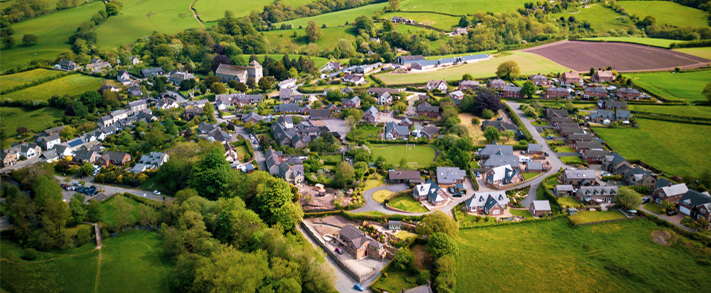Rural communities in modern Britain

The makeup of the British economy has changed a lot over time, and because of this the significance of rural communities has changed. The majority of people in Britain now live in urban areas with many residents of rural communities now commuting to those urban areas to work. With the service and financial sectors now dominating the British economy, issues concerning farming and the welfare of those in rural communities have become less significant. Farming no longer represents a major part of the British economy, and there is an increasing bias towards issues concerning urban areas with rural issues becoming less of a concern to those in government and wider society. As a result the declining importance of farming as an important source of local income and employment during the 20th century, has changed the face of rural Britain.
Farming

The move away from a reliance on domestic agriculture and industry has meant that many people who would have relied on rural industries such as agriculture or mining for employment have had to move to urban areas to find work in increasing numbers. Many farmers have benefitted from EU subsidies since the U.K. entered the European Union, however some people believe that an industry that represents such a small part of the British economy should not receive the amount of taxpayer funded support that it does. Despite the recession some farmers are managing to prosper in difficult times. The weakness of the pound against other European currency has meant that it is easier for farmers to export livestock, as British prices are more competitive. They have seen their costs fall whilst the price of meat has increased, allowing the industry to recover from the decline that was seen during the Foot and Mouth crisis in 2001.
Crime and Unemployment

With the U.K. in the midst of a recession, people in rural communities are not immune to its effects with unemployment rising sharply in many rural parts of Britain such as Cornwall and North Yorkshire. People looking for work in rural areas are at a disadvantage because of the distances involved with searching for work which makes the prospect of unemployment for residents of smaller communities quite daunting. Another effect of the recession on rural communities has been an increase in the amount of criminal activity. Burglary and theft of valuable farming equipment is on the rise as more people who have fallen on hard times resort to crime.
Rural Communities

The changing structure of the British economy has affected the demographics of rural communities across the country. The widespread use of the car and increase in personal affluence has created a generation of commuters, who are able to live far away from the urban areas they work in. Unfortunately for many small villages and towns the tendency for commuters to spend a lot of money and time in urban areas means that they do not benefit much financially from commuting residents. Commuters also tend to push house prices up which prices out younger locals who cannot afford the house prices and have to move to cities to find affordable living and work.
